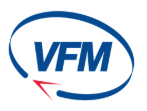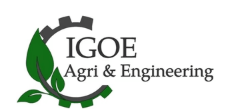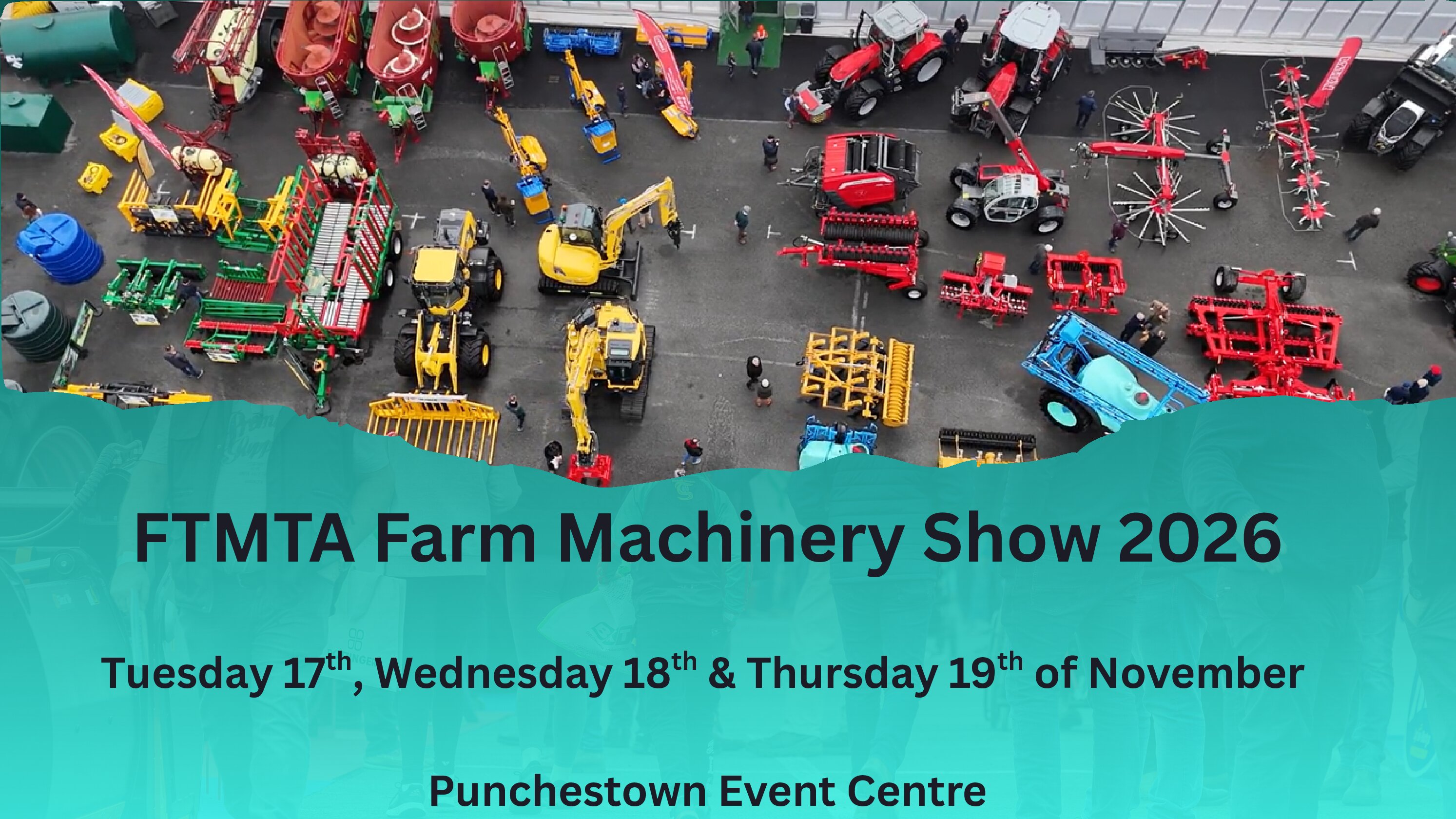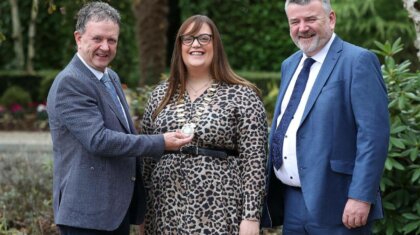Farm Machinery Trade Upbeat
The Irish farm machinery trade faces 2019 and whatever challenges it may present in a perhaps surprisingly upbeat mood. At the time of writing, the Farm Tractor & Machinery Trade Association (FTMTA), the representative body for the sector in Ireland has just put the shutters down on what has been the largest ever FTMTA Farm Machinery Show. The Show, organised by the Association, is the flagship event for the Irish farm machinery industry and this year marked 30 years since the first such event was held by FTMTA at the RDS during February of 1989. In 2003 the FTMTA Farm Machinery Show moved to its current location at Punchestown Racecourse which has facilitated considerable growth and improvements in the event. This year, it is widely felt, saw the Show reach a new level with over 16,000 square metres of indoor exhibition space across five buildings as well as a substantial area of outdoor displays. The addition of nearly 2,000 square metres of indoor exhibition space since the previous event allowed the Association to facilitate new exhibitors as well as meeting a demand from existing exhibitors for increased stand sizes. The Association was delighted that so many of the existing exhibitors seized the opportunity to significantly increase the size of their stand in order to better showcase their range of products to the Show visitors. The level of presentation of many stands also saw a substantial upturn this year which added to the visitor experience of the Show. Apart from the efforts of organisers and exhibitors the only worthwhile benchmark for any trade event is the level of visitor engagement and, on that front, exhibitor feedback has been very positive. Over 20,000 people visited the Show over the three days and the Chief Executive of FTMTA, Gary Ryan, states that exhibitors report a high level of good quality enquiries as well as a substantial amount of business actually done at the Show. The FTMTA CEO believes that this year’s Show saw the highest level of completed sales that he is aware of at any FTMTA event in his over 10 years at the helm of the Association. Ryan admits that the level of optimism evident at the Show from both the trade and customers took him somewhat by surprise in light of the uncertainty surrounding Brexit but believes that customers have faith in their farming businesses and are continuing to make the investment they require in mechanisation to make their businesses more efficient.
The buoyant mood in evidence at the FTMTA Farm Machinery Show was borne out in the end of year numbers produced by FTMTA in relation to the registrations of tractors and other self propelled equipment during 2018. The original figures produced by FTMTA in early January showed a tractor market not much changed from that of 2017. Later in the month it became apparent that the information provided to FTMTA during 2018 was incomplete. As a result, the Association undertook a full review of all new tractor and related registrations for 2018 and the revised figures show that last year saw the highest level of new tractor registrations since 2008 when some 4,500 tractors were registered in the last year influenced by the so called Celtic Tiger. In the intervening years the registration of new tractors fell as low as 1,315 new units in 2010, recovering to nearly 1,900 units in 2015 and 2016, fell back to just less than 1,800 units in 2017 and climbed to nearly 2,000 units last year.
The final 2018 figures from FTMTA show that 1,984 new tractors were registered during last year which was an increase of 10% on 2017 and is the closest that the industry has gotten to a much hoped for market size of 2,000 units since the onset of the global downturn and recession in 2008. In that time, we have seen the average horse power of new tractors registered in Ireland grow steadily with nearly 90% of all registrations in 2018 being tractors of greater than 100hp and over 54% having more than 120hp. The five counties with the highest levels of new registrations during 2018 are Cork with 258 units (up from 206), Wexford with 157 units (up from 115), Tipperary with 156 units (up from 151), Kilkenny with 131 units (up from 90) and Galway with 112 units (up from 110).
Telehandlers also experienced a very good year with 427 units registered which was a 40% increase on the level of 2017. The telehandler market has enjoyed three very strong years with volumes having more than doubled from the 185 units registered in 2015. Clearly many of these units are entering use in the construction and commercial sectors but this type of machine is growing in popularity for agricultural use also and a significant number of these machines are to be found on Irish farms where they seem to quickly become something that the owners could not do without. Wheeled loaders are another machine type that had a good year in 2018 with registrations climbing by over 40% to 120 units. Nearly 50 of the total number of wheeled loaders were registered in April and May which points to many of these machines going into agricultural use with contractors at the start of the silage season.
As is to be expected, the performance of the farm machinery trade domestically is a reflection of the fortunes of the agricultural customer base which it supports. 2018 saw a continuing strong level of activity from the dairy sector, be it business directly with farmers or with contractors and the tillage sector saw a welcome improvement on recent years. The monthly registration figures show, both in terms of geography and tractor type and size, that, while substantial demand is coming from the stronger dairy areas, the tillage sector has renewed its investment in the larger models more suited to that activity.
2018 will be remembered for many years for the extreme weather conditions that it brought with snow in late February / early March and very cold ground conditions from February to late April / early May whereas by mid June we were experiencing drought conditions that saw land in many areas of the country turn to a near desert state. Both types of weather impacted severely on growth with huge knock on effects particularly for grass supply. The dry conditions did bring some positivity for the tillage sector particularly in terms of grain and straw prices albeit on reduced yields. Very easy harvest conditions were also of help to the sector which had endured some difficult years of late. The heat and drought of the summer was followed by much improved conditions in the autumn which saw sustained late grass growth enabling extended grazing and silage making; this in turn eased the fodder situation and allowed the rebuilding of much reduced stocks.
The difficult weather conditions depressed implement sales during the early part of the year particularly in relation to grass equipment but the onset of grass growth and forage making saw a recovery in this regard with a noticeable move toward bigger mowers. The extremely dry and hot conditions in which much first and second cut silage was made did depress sales of rakes and tedders as they were simply not required or practical in many cases. Sales of self propelled forage harvesters did enjoy a good year with around 35 units registered. The pressure on grass supplies until the autumn did help sales of other feeding solutions such as diet feeders, zero grazing systems, bale un winders and straw blowers etc.
TAMS II continued to be a significant factor in relation to sales of cultivation, slurry spreading, fertiliser spreading and spraying equipment. The support of a move towards lower environmental impact equipment in these categories is to be welcomed as this is reflective of what is required by the end consumer in these times of heightened environmental awareness. Obviously agricultural practices are coming under increased scrutiny and it is important that agricultural professionals are supported to invest in the mechanisation innovations which can help to lessen the environmental impact of food production. Much of this technology comes with the twin benefit of reducing and controlling input costs which is key to improving profitability.
State of the art machinery, such as that grant aided by TAMS, is a complex product requiring skilled support. FTMTA and our farm machinery trade members are conscious of this and realise that it is incumbent on the industry to ensure that the skills are in place across all aspects of the business to fully support the customer. All elements of the Irish economy are experiencing difficulty in filling employment vacancies and this seems to be a particular problem for various business in the agri sphere. The farm machinery sector needs to become better at actively selling itself as an industry in which long term and rewarding careers can be developed. We require high calibre staff to take our industry into the future and in a competitive labour market you have to work hard to secure the right candidates for your business.
Obviously Brexit continues to hang over the Irish machinery sector and the wider agricultural and overall economies. The sad reality is that, at the time of writing, we are no clearer on the shape of the final outcome than we were a year ago. That said, the reality of a no deal Brexit is probably becoming more possible and the machinery sector must, as all other sectors, prepare for that. Much of the supply chain for internationally produced equipment on the Irish market has previously been routed through the UK and that seems likely to change. Most international suppliers have plans in place to deal with the continuation of a smooth supply to their Irish customers and it is to be hoped that Irish farm machinery businesses and their customers do not see any impact on either cost or lead times.
FTMTA and the wider machinery trade, Brexit notwithstanding, are moving into another year with confidence. Irish farming has survived many challenges over the years and will come through whatever the next few months brings also. Ireland is a producer of top quality food which will there will always be a customer for and our machinery industry has its role to play in ensuring that Irish farmers can do their job efficiently and profitably. The latest tractor registration figures to hand cover the month of January and show a continued high level of registrations coming off the back of the previously
Be a part of a stronger, professional, farm machinery industry – join the Farm Tractor and Machinery Trade Association – contact FTMTA at 045 409309 or membership@ftmta.ie for details.




